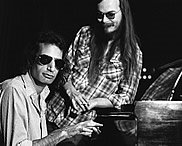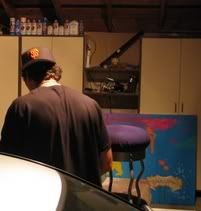I got this from Davey D.
******
Bigger than Hip-Hop: The Nat'l Hip Hop Political Convention Bigger than Hip-Hop
By Jeff Chang
July 07, 2006
www.pbs.org/pov/borders/2...00326.html
An Interview with TJ Crawford of the National Hip-Hop Political Convention
Also check out the official website...
www.2006hiphopconvention.org/
Later this month, from July 21st through the 23rd, the 2nd National Hip-Hop Political Convention gets underway in Chicago. The first convention, held in Newark two years ago, created much excitement amongst hip-hop activists. Hip-hop activists hoped to mobilize their generation's equivalent to the 1972 National Black Political Assembly in Gary, Indiana, an historic event of the Black Power generation. Thousands from across the country sent their Local Organizing Committees to set the first ever National Hip-Hop Political Agenda.
Here we speak with T.J. Crawford, the Chair of the Host Committee for the 2006 Convention. Known as Theoretic the MC, Crawford is recognized as a one of the 10 most influential people in hip-hop and politics. He was an organizer for Atlanta's renowned Youth Task Force, and founded the Chicago Hip-Hop Political Action Committee. As he prepares for the Convention in Chicago, we spoke to him about the impact of the 2004 Convention on the politics of the hip-hop generation.
Jeff Chang: What made the 2004 National Hip-Hop Political Convention so historic?
T.J. Crawford: I think the 2004 NHHPC was a historic event because, for our generation, something like this had never been done before. Hundreds of people from differing cities and states came together to develop a national agenda that actually came from the bottom up versus the normal top down approach. Nobody sat up and legislated what would be the main areas of focus for the entire country, but instead you had local communities identifying what they found common amongst each other, and then we developed the national agenda using the locals as a base. That's powerful.
And beyond that, you had some of the best organizers, activists and academicians in the country, along with some of America's most committed and community involved young adults, mostly of color, sitting together in one place, smashing through issues, with the specific intent of getting something accomplished...of building an apparatus and preparing themselves to exercise power. The energy that you get from something like that is indescribable, and it has spawned national relationships and organizational partnerships that are continuing to this day. The web of hip-hop activism, a combination of the culture, grassroots and electoral politics, continues to grow and gain strength. It has already caught hold with so many people. I look forward to growing with it.
Jeff Chang: In the wake of the convention, how have you seen organizations like your own and similar ones across the country used hip-hop to change their communities?
T.J. Crawford: From a cultural perspective, there are countless names and organizations that we could run down that are literally saving young people's lives through after school and Saturday programs that feature hip-hop in the dance, video, film, music production, spoken word, graff and mural projects. There are thousands of people out there that are meeting kids right where they're at, giving them a harsh look at reality, while also introducing them to the power that they hold within themselves.
The expressive part of hip-hop culture, without the violence, and with knowledge of self, is the most empowering thing moving today. Not because of anything unique to hip-hop, but because hip-hop, in my eyes, is a combination and continuation of all indigenous art forms and learning pathologies that have come before. So it's like the best of all worlds finding a home in the five elements.
Now, politically speaking, I think we're still working to find our groove. I mean, you've got projects such as Biko Baker and the Campaign Against Violence in Milwaukee, and Khari Mosley and the League of Young Voters work out in Pittsburgh. You've got Troy Nkrumah and cats in Las Vegas moving against the anti-hip-hop ordinance and you've got more organizations than you can name that have shown tremendous support for the victims of Katrina, but as a generation, I think we're just getting to the point of being serious about institution building, to the point that we can change the institutions that run this country.
People like Alisha Thomas Morgan in Georgia and Ras Baraka are working to make waves on the elected side, but we're still working to get the hip-hop community to see itself as an electoral base that can move things, right here, right now. And that will only come with institution building, which is one of the things that this year's convention hopes to support.
Jeff Chang: The first Convention began with a heated, raucous day-long panel on intergenerational relations in which elders and hip-hop generationers tried to come to a middle ground about issues that divided them. Do you still see the generation gap as a pressing issue in 2006?
T.J. Crawford: I think the gap is closing, really. And I don't think it was as large as we sometimes want to say it is. Community leaders of the past don't want to give you any props until you do something, and young cats find it hard to make it happen unless some of the older folks get out the way. Well, as the Creator would have it, our communities are getting bombarded from all sides and the traditional leadership is slowly yet steadily passing away. People of conscience are recognizing this shift and are scrambling to prepare and support this current generation of leadership with the means, know how and opportunity to take over the mantle of leadership. And a lot of us are grasping the reins. I mean, don't get me wrong, there is still a lot of egotism and in fighting that takes place, especially amongst those that get checks from corporations for being THE community advocate, but I see more and more examples of the elders reaching out to work with young people, especially in my situation, and some of the people I know. So I'm encouraged by that.
Jeff Chang: What will be the two or three main issues you expect organizers and activists will be discussing at this Convention?
T.J. Crawford: It's hard to wittle that down to just three things, because there are so many issues that are relevant and intertwined. How can you talk about the effects of Hurricane Katrina without talking about our present economic situation or the lack of committed public officials and corporate leaders that not only care, but have the power, to make sure that all of this country's citizens have the basic necessities to live a healthy and sustainable life? How can you talk about basic necessities without talking about education, especially early education, as a necessary premise for mental and physical development? How can you talk about improving education without moving to the criminal justice system and the whole sale warehousing of Black and Brown youth, who seem increasingly SET UP for failure.
I don't know man, cutting it to three, that's hard. But if I had to choose, I'd probably say that it's going to be the media, institutional development, and crimes against humanity, including the aftermath of Katrina, the war, and the inept education and rehabilitative systems. You liked the way I got past the number three, huh?!
Jeff Chang: The hip-hop generation now seems to span 14 year-old youths to 40+ year-old adults. What do you see as the long-term effects of the Convention on this generation?
T.J. Crawford: I see the 2006 convention as a training ground where organizers, both younger and older, will pick up and enhance their skill set so that they can return home with an even greater ability to create the change that the want to see. I see the updating of the National Hip-Hop Political Agenda, and the promotion of it even after the convention, as a way to guide the generation from both a political and community standpoint, helping to shed light on the issues and keep us focused as we work to address them. And finally, I see the true merging of hip-hop culture and civic engagement as something that will take root and spawn some sustainable institutions that will still be around 20 to 30 years from now.
I think the convention will continue to challenge conventional wisdom (pun not intended!) and dare people to put up or shut up. Stop talking or start walking. It's your choice. We are all responsible and will be held accountable for the world that we live in, starting first with ourselves, our families and then onto the communities in which we live. I see it continuing to blur the line between grassroots activism and electoral participation. And I see it definitely helping to define hip-hop Culture for ourselves instead of regurgitating what others would have us believe it is. Our political and economic might, held together by cultural commonality and strength, will continue to provide us with the means to tell our own stories and to write our own checks. Some of that stuff we're doing already. It's about expanding it so there's enough benefit and opportunity for all of us.
===================================
The 2006 National Hip Hop Political Convention
The 2006 National Hip Hop Political Convention, scheduled to be held in Chicago, IL from July 20– 23, 2006 at Northeastern Illinois’ Jacob Carruthers Center for Inner City Studies, will build upon the past success of the 2004 convention in Newark, New Jersey to become one of the largest youth led, civic education projects in the history of the United States! By training, educating and engaging youth and young adults from across the country about the ins and outs of commerce, grassroots activism, issue education, personal and collective responsibility, community development, governmental processes and civic participation, the 2006 National Hip Hop Political Convention will help shape our country’s outlook and activities for years to come!
Money. Power. Respect. Convention Goals
The term Money, Power, Respect is universally understood among members of the Hip Hop Generation, with many of us engaged in a never ending quest to attain all three. For our purposes, it is a term derived from an economic (Money), political (Power) and social (Respect) construct that acts as a starting point from which we can examine ourselves as both individuals and a society. It speaks to how we provide for ourselves, how we interact with one another, how we affect our own reality, and identifies that which we, as a community and as a generation, hold in high esteem. The 2006 National Hip Hop Political Convention will celebrate, encourage and energize the national work of the Hip Hop community by:
1) Strengthening a state based, national coalition of hip hop organizations and leadership, via our National Assembly and the updating of the National Hip Hop Political Agenda
2) Providing training and organizational support for 1,200 Hip Hop leaders from across the country (Convention Delegates)
3) Hosting 10,000 youth and young adults interested in joining the community empowerment efforts of the Hip Hop Generation, via our concerts, workshops, town meetings and expo areas
4) Raising $150,000 for NHHPC staff and office space
5) Generate tourism dollars for the city of Chicago that is, both directly and indirectly, associated with the convention during its duration.
6) Registering over 50,000 young adults to vote before, during and after the convention.





